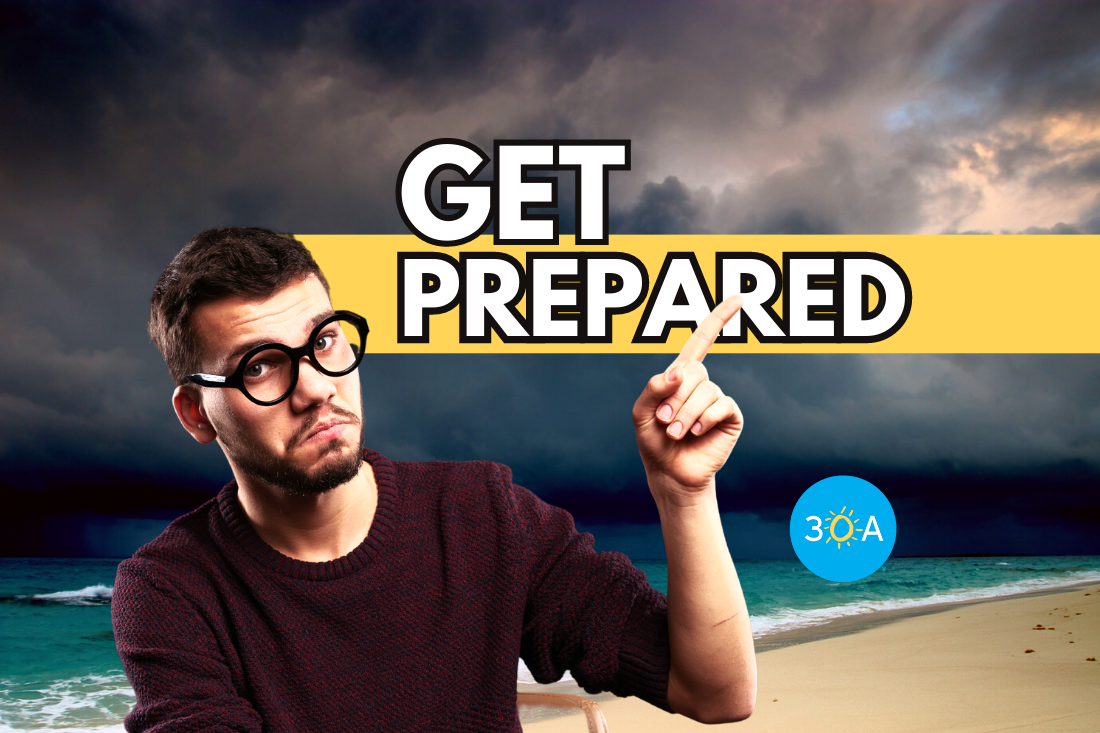


Bookmark this page to stay on top of important 30A weather developments, including hurricanes, tropical storms, and other events impacting Florida’s Northwest Gulf Coast.
It’s been said there are two things in life that are certain, and I am sure we are all familiar with that old saying. It’s also a reality for those of us who live on our beautiful coasts that Hurricane Season is the third certainty, and like taxes, we face it each year.
The Atlantic hurricane season runs from June 1 to November 30, while the Eastern Pacific hurricane season runs from May 15 to November 30.
Each year hurricanes are responsible for millions of dollars in land and property damages, and sadly bodily harm and deaths.
While some folks living in paradise take these stats in their strides, it just makes good sense to be as prepared as possible for this unpredictable certainty.
The first thing most hurricane scientists and reporters want you to know is that if you are in the predicted path (aka “the cone of uncertainty) of a hurricane, you should always pay close attention to continuous weather updates, recommendations, and instructions. These reports are available via TV, digital devices, and radios and are designed for one purpose: the safety of the citizens and the first responders who will take up the task of assisting those in crisis. It’s also important to remember hurricanes are not just a coastal problem. High winds, rain, flooding, and even tornadoes can occur inland from where a hurricane makes landfall. By paying close attention to the authorities, you will know your hurricane risks. The number one cause of loss of life in a hurricane is drowning second to complacency. Take the reports seriously, and always follow the instructions of the authorities while prepping for a big hurricane. By following this rule you and your family will know your evacuation zone and be more prepared in case of a mandatory evacuation order.

• Blankets, clothes and enough freshwater, energy drinks, and food for two to four weeks for each family member, including pets. Have pet carriers available.
• Important documents should be kept in the kit in a dry bag or plastic waterproof zip bag. Be sure you have your identification, passport, birth certificate, social security card, homeowners insurance papers, and pet vaccine records, or copies of these items in the kit.
• Cash and a battery operated weather radio
• Flashlights, a small gas cooktop, emergency candles, waterproof matches and/or lighter, an extra car charger and phone charger, a whistle, and extra batteries, including 9 volts are essential. Don’t forget to prepare to have enough medication on hand for a minimum of two weeks.
• First aid kit including hand sanitizer and hygienic wipes.
• A multi-tool item such as a Leatherman, which includes small essential tools and a sharp knife.
• A full tank of gas is recommended for each family vehicle
• In the event of a major hurricane, the installation of hurricane shutters should be considered.
• For convenience and efficiency, there are ready-made survival kits (sustain.com), generators and portable solar power stations (ecoflow.com) available for purchase.
The CDC now recommends visiting their website for information regarding special COVID guidelines in the face of a local, state, or national emergency.

In the event of a power outage, it’s likely your local power provider is already aware, but in case of downed or sparking power lines call 1-800-342-5397. It’s always a good idea to have a sticker or small placard on your doorway showing the number of occupants and pets residing in your home. Always remember, if you or someone you know is in immediate danger, or in case of fire, exit the premises and call 911. Remember your first responders will be taxed during a disaster, rest assured, if you help yourself, it will better prepare them to assist you in a true emergency.
If your local beach safety operations have a flag warning system, be sure you are familiar with all the flags and their meaning.
Double red or red hurricane marked flags mean that the water is closed to the public. In the event that you purposefully enter the water while these flags are up, you could be subject to a fine, or even arrest. If you do decide to or are mandated to evacuate your residence, never attempt to drive your vehicle through flood waters. Remember “turn around, don’t drown.”
It’s a little-known fact that most counties have a non-emergency phone number to be called in the case of a non-life-threatening emergency. It’s a good idea to have this number in your phone and use it accordingly in order to take the burden off of the 911 system as they deal with life threats.
While we all hope never to find ourselves or our loved ones in an emergency, the truth is, most people will at one time or another experience difficult or emergent times. Hurricanes are always something to be taken seriously when living on any coast. It’s a good idea to stay calm, don’t panic, and make sure you are ready. There are several good organizations and websites to keep you updated, and also help you to prepare in advance, so as not to get caught in the rush that an emergency can create (see below). Let’s all remember to help our neighbors and seniors too. In the meantime, enjoy the sunshine and stay safe!




